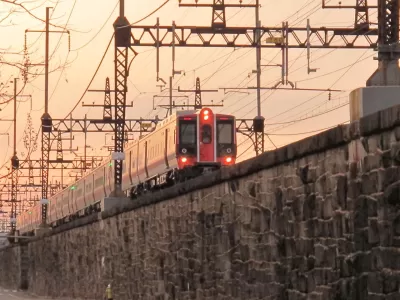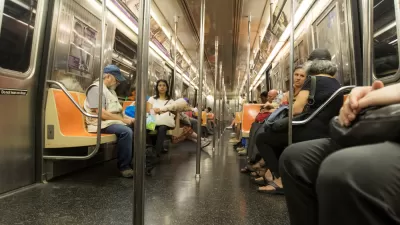Investing in technology and promoting innovation in the transportation sector can further the Biden administration's goals of reducing carbon emissions and improving public transit.

Despite the head-spinning advances in technology in the last few decades, write Tiffany Chu and Daniel Ramot in Bloomberg CityLab, "only a small fraction of public transportation budgets are allocated to innovation and technology, lagging significantly behind other sectors." This, argue the authors(who are also "founders of transit technology companies whose software powers public transportation systems in hundreds of cities across the world"), has hindered the development of effective and equitable transit systems. The federal government should, in their opinion, "radically rethink its approach" to transportation funding and support local agencies in implementing innovations that will improve service.
"If we want to make real progress in creating a new vision for American mobility, the Biden Administration and Congress will need to stop funding transportation like it’s the 1980s. It is time to move past our excessive focus on large highway capital projects and remove limitations that constrain how cities and rural communities deploy public transportation."
Chu and Ramot include several recommendations that they believe can help us "plan smarter transit networks, build safer streets, and launch more nimble services designed to immediately enhance transportation for those who need it most," which include creating dedicated funding to "drive innovation," tying funding to concrete outcomes, and funding transit operations as well as equipment.
FULL STORY: Fixing Transit Is More Than Just Infrastructure

Planetizen Federal Action Tracker
A weekly monitor of how Trump’s orders and actions are impacting planners and planning in America.

Restaurant Patios Were a Pandemic Win — Why Were They so Hard to Keep?
Social distancing requirements and changes in travel patterns prompted cities to pilot new uses for street and sidewalk space. Then it got complicated.

Maui's Vacation Rental Debate Turns Ugly
Verbal attacks, misinformation campaigns and fistfights plague a high-stakes debate to convert thousands of vacation rentals into long-term housing.

In California Battle of Housing vs. Environment, Housing Just Won
A new state law significantly limits the power of CEQA, an environmental review law that served as a powerful tool for blocking new development.

Boulder Eliminates Parking Minimums Citywide
Officials estimate the cost of building a single underground parking space at up to $100,000.

Orange County, Florida Adopts Largest US “Sprawl Repair” Code
The ‘Orange Code’ seeks to rectify decades of sprawl-inducing, car-oriented development.
Urban Design for Planners 1: Software Tools
This six-course series explores essential urban design concepts using open source software and equips planners with the tools they need to participate fully in the urban design process.
Planning for Universal Design
Learn the tools for implementing Universal Design in planning regulations.
Heyer Gruel & Associates PA
JM Goldson LLC
Custer County Colorado
City of Camden Redevelopment Agency
City of Astoria
Transportation Research & Education Center (TREC) at Portland State University
Jefferson Parish Government
Camden Redevelopment Agency
City of Claremont





























